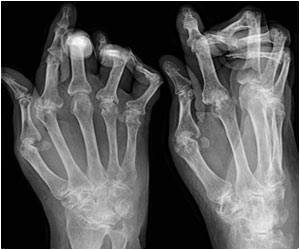A potential target for rheumatoid arthritis has been discovered by Newcastle University scientists.

In rheumatoid arthritis the body's own immune system attacks the joints. Typical approaches for treatment involve blocking the signals in the body which activate the immune system to attack the joint. In contrast, this new strategy will prevent damaging white blood cells from entering the joints in the first place.
Lead author Dr Graeme O'Boyle described the agent's action: "Imagine that the damaged joint is covered in flags which are signalling to the white blood cells. Traditional treatments have involved pulling down the flags one by one but what we have done is use an agent which in effect 'blindfolds' the white blood cells. Therefore, they don't know which way to travel and so won't add to the damage."
Publishing in PNAS the Newcastle University scientists describe how the agent called PS372424 prevents activated T cells, the white blood cells which cause the damage, from migrating towards the site of rheumatoid arthritis. To show the effectiveness of their new treatment, they have developed a new mouse-model of arthritis which has a human immune system. They discovered that PS372424 blocked the ability of human T cells to move towards a pouch of synovial fluid from patients with active rheumatoid arthritis.
In the work they found that PS372424 binds to a specific receptor CXCR3 which is only found on activated T cells. This targets the 'blindfold' to only these T cells, and leaves other white blood cells unaffected. As Dr O'Boyle explains: "By desensitising damaging white blood cells using CXCR3 they are not directed to migrate towards rheumatoid sites. The advantage of this system is that it is much more specific than current medications and may not compromise the immune system."
Professor Alan Silman, medical director of Arthritis Research UK said: "Although modern treatments have changed the outcome for many patients with rheumatoid arthritis, firstly not all patients respond to them and secondly, even in those patients who do respond in some way, we can't completely get rid of the inflammation that damages their joints.
Advertisement
The next stage of the work is to engineer PS372424 to improve its drug-like properties with a view to getting it ready for clinical trial.













